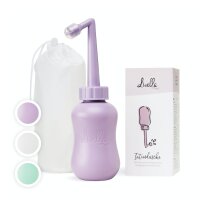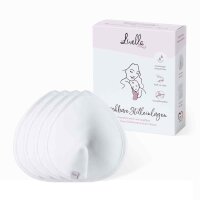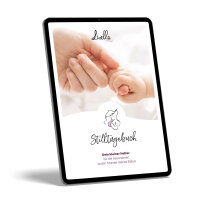Many parents eagerly anticipate the arrival of their baby for months – only to find that everything changes in an instant when their baby arrives prematurely. The time spent in neonatal intensive care, the many medical interventions, and the constant uncertainty can be overwhelming. During this difficult period, breastfeeding can provide an essential emotional bond – and it can be crucial for the health of the premature baby.
However, breastfeeding a premature baby presents unique challenges. In this article, you’ll learn why breastfeeding is so valuable, what hurdles you might face – and how you can best support your little one on this journey.
Table of contents
Why is breastfeeding particularly important for premature babies?
Challenges of breastfeeding premature babies
How to support breastfeeding with premature babies
Breastfeeding or bottle feeding: What’s better for premature babies?
When should you seek support?
Summary: Breastfeeding a premature baby – a special journey
FAQ – Frequently asked questions about breastfeeding premature babies
Why is breastfeeding particularly important for premature babies?
Breast milk is important for all babies – but for premature babies, it can be lifesaving. It provides:
- High levels of antibodies that protect the immature immune system
- Essential nutrients tailored to the needs of the premature body
- Growth factors that support the development of digestion, the brain and organs
The first milk, known as colostrum, is especially valuable for premature babies. In our article Breastfeeding: The First Days After Birth, you can find out why this early milk plays such a crucial role.
Premature babies also benefit from breast milk by:
- Gaining weight more quickly
- Learning to feed more effectively
- Developing fewer serious infections
Challenges of breastfeeding premature babies
Breastfeeding a premature baby can be difficult for many parents:
- The sucking reflex is often underdeveloped in very small babies
- Their sucking strength is weak at first, making it harder to latch onto the breast
- Medical equipment and monitors can interfere with skin-to-skin contact
- Babies often spend their first days or weeks in neonatal care, separated from their mother
These circumstances demand patience, support, and sometimes creative solutions. Especially after a complicated birth or Caesarean section, breastfeeding can pose an additional challenge.

How to support breastfeeding with premature babies
With empathy, professional support, and small steps, breastfeeding can still succeed. Here are some proven methods:
- Breast pump: Regular pumping (every 2–3 hours) helps stimulate milk production and build up a supply for the baby.
- Nipple shields: These can help tiny babies latch more easily onto the breast.
- Supplemental nursing systems (SNS): A fine tube delivers milk directly during breastfeeding if the baby is too weak to suck effectively.
- Kangaroo care: Frequent skin-to-skin contact strengthens bonding, boosts milk supply, and supports the baby’s feeding behaviour.
Each of these methods can make a significant difference to the early breastfeeding journey.
Breastfeeding or bottle feeding: What’s better for premature babies?
If direct breastfeeding is not yet possible, expressed breast milk is the best alternative.
It offers not only ideal nutrition but also crucial protection for the baby’s immature organs – you can read more about its benefits in our article Breast Milk: Benefits for Mother and Baby.
Expressed breast milk can be offered via:
- A special bottle
- A feeding tube
- Finger feeding
Formula milk should only be used in exceptional cases where breast milk supply is insufficient or for specific medical reasons.
Combining breastfeeding and bottle feeding can also be a good transitional approach until the baby becomes stronger.

Emotional support for mothers of premature babies
The period after a premature birth is an emotional rollercoaster. Many mothers experience a mix of hope, fear, exhaustion, and uncertainty.
While other parents might be cuddling their newborns at home, mothers of premature babies often spend long hours in the neonatal unit, surrounded by beeping monitors and constant medical concerns.
Common challenges during this time:
- Uncertainty: Will I be able to care for my baby properly? Is my milk enough? Will breastfeeding succeed?
- Anxiety: What if complications arise? Will my baby grow up healthy?
- Exhaustion: Frequent pumping, nighttime hospital visits, and emotional strain can take a toll.
Many mothers feel isolated and misunderstood by those who have not experienced a premature birth.
Remember:
Your own wellbeing is just as important as caring for your baby. Looking after yourself with enough rest, proper nutrition, and conscious relaxation breaks will help you stay strong throughout this time.
Support options that can help you:
- Talking to experienced breastfeeding consultants or neonatal specialists
- Joining support groups for parents of premature babies
- Practising relaxation techniques and allowing yourself small moments of rest
You don’t have to be perfect. Every little step counts – for your baby and for you.
When should you seek support?
Even if you are determined and resilient, there are moments when seeking help is essential.
Asking for help early is a sign of strength and responsibility – not weakness.
Get support if:
- Your baby tires easily during breastfeeding and doesn’t drink enough
- Weight gain is slow or your baby struggles to gain strength
- You experience persistent pain when pumping or breastfeeding
- You feel emotionally overwhelmed – with ongoing sadness, anxiety, or helplessness
Midwives, breastfeeding counsellors, and doctors can offer targeted support and help you adjust your approach.
Sometimes a single encouraging conversation or a small practical change can make all the difference.
Summary: Breastfeeding a premature baby – a special journey
Breastfeeding a premature baby is a challenge – but a rewarding one.
With patience, professional support, and knowledge of your baby’s needs, you can successfully establish breastfeeding.
Remember:
Every drop of breast milk counts and strengthens your baby’s start in life. Don’t hesitate to seek support – you don’t have to walk this path alone.
FAQ – Frequently asked questions about breastfeeding premature babies
Can every premature baby be breastfed?
In most cases, yes – though it may require extra patience and support.
How often should I pump if my premature baby can't yet breastfeed?
Every 2–3 hours (at least 8 times a day), including during the night, to maintain milk production.
What should I do if my premature baby won’t latch onto the breast?
Stay patient, offer regular skin-to-skin contact, and use breastfeeding aids if needed.
What breastfeeding positions are best for premature babies?
The "football hold" or lying on the side can provide stability and closeness.
How long should I breastfeed my premature baby?
At least until the baby is ready for weaning – and beyond if desired.
References
- https://www.schwangerundkind.de/stillen-fruehchen.html
- https://www.familienplanung.de/schwangerschaft/nach-der-geburt/das-wochenbett-von-a-bis-z/stillen-von-a-bis-z/stillen-nach-fruehgeburt/
- https://www.stillen.de/wp-content/uploads/2021/06/Das-Leben-mit-fruehgeborenen-Babys.pdf
- https://www.elternleben.de/baby/fruehchen/fruehchen-stillen/
















